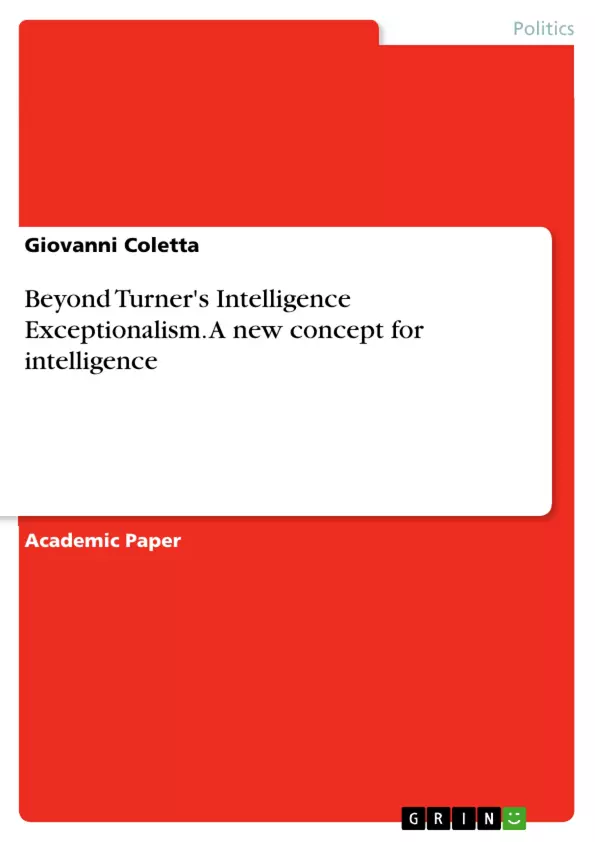In the igniting debate about whether intelligence represents or not an exceptional entity, it seems that an “uniqueness theorem” is hardly applicable in its entirety to the concept of intelligence. Intelligence is exceptional, but not categorically exceptional. Of all the four characteristics that according to Turner establish the foundation of “intelligence exceptionalism” – secrecy, law compliance, deception and fungibility –, only secrecy is genuinely exceptional about intelligence. The weakest part of Turner’s definition is undoubtedly the lack of comparison of each point with other activities: starting from this and through a series of juxtapositions, this analysis seeks to explain what the strong limits of Turner’s definition are.
Inhaltsverzeichnis (Table of Contents)
- Beyond Turner's exceptionalism
- A new concept for intelligence
- Secrecy: The core of Intelligence exceptionalism
- Secrecy as a guiding principle
- Secrecy: An intelligence prerogative?
- Law Compliance: Breaking the Law in the Name of Intelligence
- Intelligence operating beyond legal limits
- Technology and modernity blurring the lines
- Deception: A Key Feature of Intelligence Operations
- Deception: A vital tool in intelligence
- Deception: Shared with other entities
- Fungibility: Adaptable Intelligence and its Limitations
- Intelligence as a multi-purpose tool
- Fungibility: A shared characteristic
Zielsetzung und Themenschwerpunkte (Objectives and Key Themes)
This analysis seeks to re-evaluate the concept of "intelligence exceptionalism" as defined by Michael Turner, challenging its inherent Americanocentrism and examining the validity of its claims beyond the U.S. context. The analysis explores whether the four characteristics Turner identifies as defining intelligence exceptionalism - secrecy, law compliance, deception, and fungibility - actually hold true when compared to other entities and activities.
- Re-evaluating Turner's definition of "intelligence exceptionalism"
- Comparing intelligence to other entities and activities
- Examining the impact of modernity and technology on intelligence
- Analyzing the role of secrecy, law compliance, deception, and fungibility in intelligence
- Exploring the limitations of applying "intelligence exceptionalism" universally
Zusammenfassung der Kapitel (Chapter Summaries)
The analysis begins by examining the core characteristic of "intelligence exceptionalism": secrecy. It explores the argument that secrecy serves as a guiding principle for intelligence operations, citing examples such as the British code-breaking efforts during World War II. However, it also presents counterarguments by showcasing how other entities, such as Swiss banks and Apple, employ secrecy in their operations. Ultimately, the analysis concludes that while secrecy plays a pivotal role in intelligence, it may not be solely exclusive to it.
Moving on to law compliance, the analysis delves into the argument that intelligence operates outside the bounds of conventional law, citing the NSA scandal as an example. It acknowledges that intelligence agencies often operate with a certain degree of "independence" from both international and domestic law. However, the analysis also notes that technological advancements have enabled private individuals, such as Julian Assange, to access confidential information and breach national laws, suggesting a blurring of boundaries in the context of law compliance.
The analysis then explores deception, another key characteristic attributed to intelligence. It examines the "Operation Mincemeat" case, where the Allied secret services successfully misled the Nazis about their strategic landing plans in World War II. However, the analysis highlights that deception itself is not unique to intelligence, citing the Iraq War as an example where deception was used by political leaders to justify military action. Therefore, the analysis argues that while deception is a prominent feature of intelligence, it is not solely exclusive to it.
Finally, the analysis investigates the concept of fungibility, arguing that intelligence can be used for a variety of purposes. It points out that intelligence agencies have historically been employed by governments to pursue both domestic and foreign policy objectives. However, the analysis emphasizes that the fungibility of intelligence is not unique to it, as other governmental and non-governmental entities can also be used for multiple purposes.
Schlüsselwörter (Keywords)
This analysis focuses on the concept of "intelligence exceptionalism", examining its key characteristics, including secrecy, law compliance, deception, and fungibility. It compares intelligence to other entities and activities, exploring the limitations of applying "intelligence exceptionalism" universally. The analysis also examines the impact of modernity and technology on the nature of intelligence.
Frequently Asked Questions
What is 'intelligence exceptionalism'?
It is the theory that intelligence agencies operate under a unique set of rules and characteristics—secrecy, law compliance, deception, and fungibility—that set them apart from other government entities.
Is secrecy exclusive to intelligence agencies?
The analysis suggests that while secrecy is a core principle of intelligence, other entities like Swiss banks or private companies (e.g., Apple) also employ high levels of secrecy.
Does intelligence always operate within the law?
Intelligence agencies often operate beyond conventional legal limits (as seen in the NSA scandal), but this boundary is increasingly blurred by technology and private actors like Julian Assange.
What is meant by the 'fungibility' of intelligence?
Fungibility refers to intelligence being a multi-purpose tool that can be used for various domestic and foreign policy objectives, though this trait is shared by other government branches.
How does technology impact intelligence exceptionalism?
Modern technology blurs the lines of secrecy and law compliance, as private individuals and organizations can now perform activities previously reserved for state intelligence agencies.
- Quote paper
- Giovanni Coletta (Author), 2017, Beyond Turner's Intelligence Exceptionalism. A new concept for intelligence, Munich, GRIN Verlag, https://www.grin.com/document/370276



